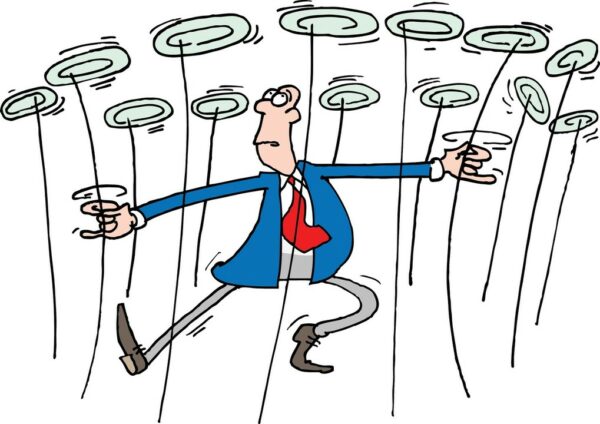
Life is like a spinning plate. In normal circumstances, the plate as it spins is balanced and in control. Occasionally, the plate will become overloaded or unbalanced, but with time will balance itself out, and life will continue along with little to no spillage from the plate.
For people battling chronic illness and pain, their spinning plate is dissimilar to that of many people. Thanks to struggles with pervasive illnesses and unrelenting pain, their plates are already full, spinning wobbly, sending the contents of the plate every which way, and, sometimes, propelling the plate into the wall or floor. Daily, small things are added to the plate, causing further imbalance. The plate owner struggles to keep the plate spinning without crashing. Sometimes he succeeds, sometimes he doesn’t. And when he fails, he makes a mess for all to see, often leading to despair.
For me personally, it is the small things in life that often fuel my depression. I can handle big things, and big decisions. It is the small things that pile up on my plate, leading me to deep, dark — at times suicidal — times in my life; moments when I just want to die. Those are times when narcotic pain medications don’t work effectively or eating food of any type makes me sick or leads to vomiting. Last night, I spent the night into the morning hours in the bathroom — sixteen visits in all. Loose bowels and lack of sphincter muscle control . . . shitty bed, shitty clothes, shitty floors, shitty, shitty, shit everywhere. An accumulation of small things that left me in despair, not wanting to live another day. Fortunately, after dropping eight pounds in less than a day, things have returned to normal — whatever the hell “normal” means.
Every day, the small things change, but their effect on my life is the same, threatening to spin my life’s plate out of control. My therapist and I often talk about small things and how they affect my life. The goal, of course, is to lessen the number of small things in my life; to lessen the small things piling up on my plate. That’s easier said than done. When your bowels say shit, you shit. When your stomach says vomit, you vomit. When your legs and spine leave you writhing in pain, you writhe in pain. Contrary to what the positive mental attitude (PMA) prophets might say, some things are beyond our control. There’s little I can do to change how my body responds to food or nerve and joint pain. I can take medications or use mental techniques to redirect my pain, but there are times when nothing I do works. All I know to do is grit my teeth and hold on, hoping that my suffering will lessen. There’s no healing or deliverance on the horizon. All I can do is endure . . . until I no longer can do so.
I wish I had the luxury of sitting back and enjoying life, but when you have chronic health problems, you have no time to waste on the “good life.” I am at the place in life where I have tied a knot at the end of the rope, and I am hanging on for dear life. I love Polly; I love my children and their spouses; I love my grandchildren; I love my siblings. I live for them. I still have writing I want to do; and a book to finish. I still want to get my house in order, so that when the day comes that my plate comes crashing to the floor one last time, Polly won’t be left with a mess. As it stands now, if I died today, my demise would leave the love of my life in a difficult spot. She deserves better, and so do my children and grandchildren.
Bruce Gerencser, 68, lives in rural Northwest Ohio with his wife of 47 years. He and his wife have six grown children and sixteen grandchildren. Bruce pastored Evangelical churches for twenty-five years in Ohio, Texas, and Michigan. Bruce left the ministry in 2005, and in 2008 he left Christianity. Bruce is now a humanist and an atheist.
Your comments are welcome and appreciated. All first-time comments are moderated. Please read the commenting rules before commenting.
You can email Bruce via the Contact Form.
